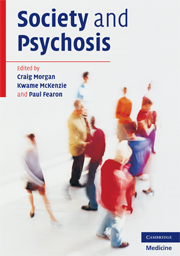Crossref Citations
This Book has been
cited by the following publications. This list is generated based on data provided by Crossref.
Broome, M.
and
Bortolotti, L.
2010.
What's wrong with ‘mental’ disorders?.
Psychological Medicine,
Vol. 40,
Issue. 11,
p.
1783.
Alexandre, Joana
Ribeiro, Raquel
and
Cardoso, Graça
2010.
Ethnic and Clinical Characteristics of a Portuguese Psychiatric Inpatient Population.
Transcultural Psychiatry,
Vol. 47,
Issue. 2,
p.
314.
Hopper, Kim
2010.
Principles of Social Psychiatry.
p.
341.
Morgan, Craig
and
Hutchinson, Gerard
2010.
Principles of Social Psychiatry.
p.
193.
Luhrmann, Tanya M.
2010.
The Protest Psychosis: How Schizophrenia Became a Black Disease.
American Journal of Psychiatry,
Vol. 167,
Issue. 4,
p.
479.
Spinelli, Margaret
2010.
Modern Management of Perinatal Psychiatric Disorders.
American Journal of Psychiatry,
Vol. 167,
Issue. 4,
p.
480.
Charalambides, Monica
Morgan, Craig
and
Murray, Robin M.
2011.
Textbook of Psychiatric Epidemiology.
p.
579.
Blechner, Mark J.
2011.
Interpersonal Psychoanalysis and Sexuality.
Contemporary Psychoanalysis,
Vol. 47,
Issue. 4,
p.
571.
Whitley, Rob
2011.
Social Defeat or Social Resistance? Reaction to Fear of Crime and Violence Among People with Severe Mental Illness Living in Urban ‘Recovery Communities’.
Culture, Medicine, and Psychiatry,
Vol. 35,
Issue. 4,
p.
519.
Clarke, Jeremy
and
Blechner, Mark
2011.
Interview with Dr Mark Blechner.
Psychoanalytic Psychotherapy,
Vol. 25,
Issue. 4,
p.
361.
Tizón, J.L.
Artigue, J.
Quijada, Y.
Oriol, A.
and
Parra, B.
2011.
A psychological and communitarian approach to treating early psychoses: A service description with some initial findings.
Psychosis,
Vol. 3,
Issue. 2,
p.
126.
Hansson, Emily K
Tuck, Andrew
Lurie, Steve
and
McKenzie, Kwame
2012.
Rates of Mental Illness and Suicidality in Immigrant, Refugee, Ethnocultural, and Racialized Groups in Canada: A Review of the Literature.
The Canadian Journal of Psychiatry,
Vol. 57,
Issue. 2,
p.
111.
Mann, Farhana
Fisher, Helen L.
and
Johnson, Sonia
2014.
A systematic review of ethnic variations in hospital admission and compulsory detention in first-episode psychosis.
Journal of Mental Health,
Vol. 23,
Issue. 4,
p.
205.
Kirmayer, Laurence J.
Rousseau, Cécile
and
Guzder, Jaswant
2014.
Cultural Consultation.
p.
1.
Jarvis, G. Eric
2014.
Cultural Consultation.
p.
291.
Keshavan, Matcheri S.
Mehta, Urvakhsh Meherwan
Padmanabhan, Jaya L.
and
Shah, Jai L.
2015.
Dysplasticity, metaplasticity, and schizophrenia: Implications for risk, illness, and novel interventions.
Development and Psychopathology,
Vol. 27,
Issue. 2,
p.
615.
Luhrmann, T. M.
Padmavati, R.
Tharoor, H.
and
Osei, A.
2015.
Differences in voice-hearing experiences of people with psychosis in the USA, India and Ghana: Interview-based study.
British Journal of Psychiatry,
Vol. 206,
Issue. 1,
p.
41.
Lewis, Jamie
and
Bartlett, Andrew
2015.
How UK psychiatric geneticists understand and talk about engaging the public.
New Genetics and Society,
Vol. 34,
Issue. 1,
p.
89.
Kirmayer, Laurence J.
Rousseau, Cécile
Eric Jarvis, G.
and
Guzder, Jaswant
2015.
Psychiatry.
p.
56.
Luhrmann, T. M.
2015.
Re-Visioning Psychiatry.
p.
305.



